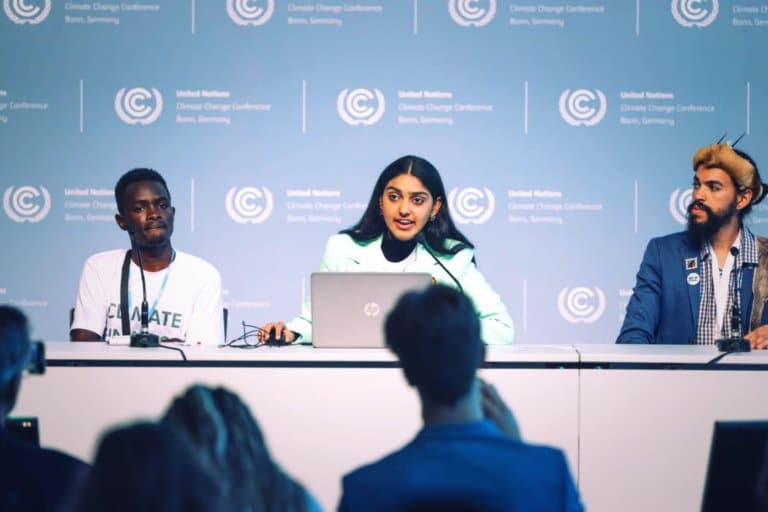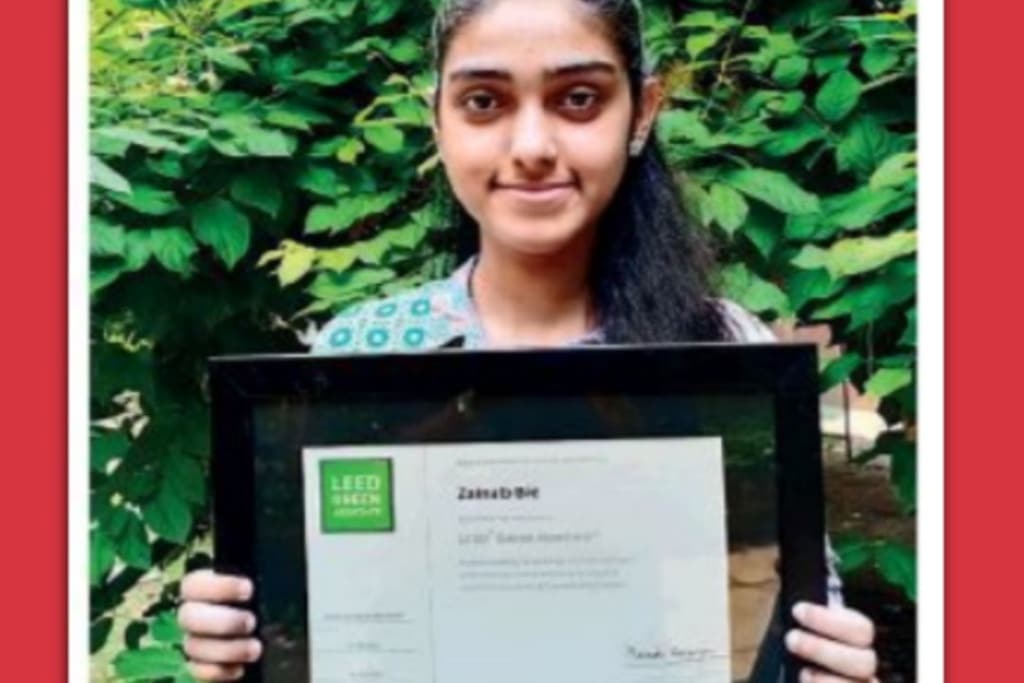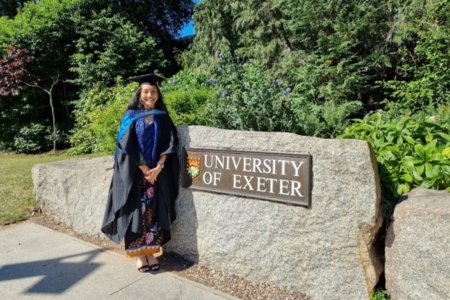
University of Delhi student Zainab Bie has every right to call for something, anything, to be done about the climate crisis.
Born and bred in the Indian capital, she’s lived her whole life in toxic air. Vehicle emissions, crop-burning and coal-fired power plants regularly shroud her home city in smog.
In 2019, air pollution was found to have caused nearly 1.6 million deaths in India, according to a study in the medical journal “The Lancet.”
“My exposure to nature was comparatively less because there are not many nature hotspots here — it’s a really urban area,” she tells Study International.
“It was full of stuff that was happening — be it river pollution and especially what we’re known for is air pollution.”
Sometimes the air it’s so bad that you can’t see far ahead to drive. Bie adds: “In terms of sanitation and hygiene, the situation in Delhi wasn’t that great.”
 An electric rickshaw driver looks for passengers along a street amid smoggy conditions in New Delhi. Seeking for solutions, she turned to the world. She connected to global communities in the US, Egypt, Tunisia, and many more.
An electric rickshaw driver looks for passengers along a street amid smoggy conditions in New Delhi. Seeking for solutions, she turned to the world. She connected to global communities in the US, Egypt, Tunisia, and many more.
Recently, the University of Delhi student was part of a panel of speakers that spoke during the SB 58 (short for the 58th sessions of the Subsidiary Body for Scientific and Technological Advice and the Subsidiary Body for Implementation) of the United Nations Framework Convention on climate change in Bonn, Germany.
She spoke at the “Connected Advocacy for Empowerment and Youth Development Initiative” press conference as a founder of the Global Economic and Sustainability Association, a representative of the Climate Education Coalition.
“Our planet is sending us distress signals — whispering through melting ice caps, scorching heat waves, and raging storms,” she shares.
“In this pivotal moment, education emerges as our weapon with the most potential against the unfolding climate crisis. Personally, for me, education became my guiding light to illuminating the path to meaningful change.”
The Delhi native was also selected as a fellow for the prestigious beVisioneers Mercedes-Benz Fellowship programme.
“Over the next 12 months, I will be part of an exceptional cohort of passionate innovators, working together to turn our planet-positive projects into reality,” she wrote on her LinkedIn.
“I am particularly excited to bring my own project to life during this fellowship. This programme will provide the perfect platform to nurture my ideas, collaborate with like-minded individuals, and take tangible steps towards creating a greener and more sustainable world.”
Life at Delhi Public School and the University of Delhi
Bie credits most of her passion for climate action and education to her time at Delhi Public School.
“When I was in grade seven, we were taken to a slum area, which was really near to our student centres,” she recalls.
“As one of the best schools in Delhi, we never experienced that kind of living standard. It made me realise the hygiene, health, as well as the environmental aspect about how we are polluting the environment.”
It bothered the student so much that she asked her school teacher if she could prepare a skit to raise awareness.
Most notably, she served as the President of the Environment Council for two years.
Her accomplishments include successfully organising anti-noise pollution campaigns, cleanliness drives, and making her school a “Single-Use Plastic Free Zone” — a title given only to a few educational institutes in New Delhi.
“Implementing the zone was one of the pivotal moments in my life that showed me that advocacy matters,” says the former President.

As President of the Environment Council, Bie successfully made Delhi Public School a “Single-Use Plastic Free Zone”. Later, she would join the University of Delhi. Source: Zainab Bie/LinkedIn
When it came time to choose what she wanted to pursue at uni, Bie pursued economics at Miranda House, a constituent college for women at the University of Delhi.
“During my time at Delhi Public School, I became so much [more] passionate about economics that I used the last two years to study it,” she says.
“Economics has models and tools. This is how we come up with our analysis, research, and economic policies. I felt that these things could bring about a much larger and impactful change. That’s why I was interested in pursuing an economics degree.”
Miranda House was an easy choice for Bie as it is the alma mater of a large number of eminent women who have excelled in diverse professions and reached the pinnacle of success.
Think Anita Desai, Mira Nair, and Urvashi Butalia.
As a student who is deeply passionate about climate action and climate education, Bie’s teachers supported her every step of the way.
“The professors helped me understand the interconnections within the climate side and economic side of things as well as helping me catch up with my coursework and academics because of my many commitments and projects.”

Due to visa issues, University of Delhi student Zainab Bie (pictured on the left) was only able to attend the Watson Institute Venture Accelerator online. She still has plans to attend the Immersive in Boulder, Colorado in-person since she received a full scholarship for the whole programme. Source: Zainab Bie/LinkedIn
Turning a global pandemic into a global opportunity
During the COVID-19 pandemic, Bie — like many students in this period —had ample free time.
The unavoidable delay in her admissions to uni meant that the Delhi native found herself on a six-month break.
That’s when Bie discovered Global Citizen Year, a non-profit based in San Francisco.
“I got to know about this exceptional community of global citizens. It is a community of students like me aged 17 to 21 all across the globe,” she shares.
“This made me really excited! I had the chance to understand their perspective and learn how people from different parts of the world would speak to me.”
The Delhi Public School graduate was awarded a US$5,000 full scholarship to join the Global Citizen Year Academy.
In this, students get the chance to use Minerva’s Forum platform. CEO Ben Nelson told Forbes about three Minerva breakthroughs: cross-contextual scaffolding for the habits and concepts, fully active learning, and a personalised platform that supports compelling learning experiences and detailed feedback.
“The classroom was very engaging. We were given several case studies — be it about the situation in Bangladesh with the cloth industry or any other problem — and were taught to think, discuss, and debate on our ideas.”
Bie shares the programme helped her gain clarity on the approach she needed to take as an economic student in creating sustainable solutions.
After completing the programme, Bie worked with Greenpeace International, an independent global campaigning network.
What she remembers most from this experience was being the youngest delegate to attend the first Climate Justice Camp in Tunisia.
At the same time, she was accepted into Watson Institute Venture Accelerator, a 16-week programme designed for impact-driven entrepreneurs. Bie received the Sistla Climate Fellowship — worth US$17,000 — to attend the programme fully funded.
Here, the Delhi native was working on a startup that focused on sustainable housing and the democratisation of sustainability-related education.

The University of Delhi student posing with her LEED Credential certificate. Source: Zainab Bie/LinkedIn
Becoming the youngest Indian to qualify and pass the LEEDS credential exam
While studying at Delhi Public School, Bie became the youngest person in the world to qualify for the Leadership in Energy and Environmental Design (LEED) Green Associate Exam, one of the most recognised sustainability credentials globally.
“It helped me understand how we can make our communities more sustainable,” she shares.
She received a scholarship from the US Green Building Council to take the exam.
As part of her preparation, the high school student interacted with current and former LEED exam takers.
“Most of them were in their mid-career or late-college life. It was daunting, but I did not back down,” the LEED Green Associate told Education Times.

University of Delhi student Zainab Bie represented the youth of the Global South (a term referring to countries classified by the World Bank as low or middle-income that are located in Africa, Asia, Oceania, Latin America, and the Caribbean) at the UNFCCC Conference of Parties’ 27 meeting in Sharm El-Sheikh, Egypt. Source: Zainab Bie
Working with the United Nations
As a climate action advocate, Bie dreamed of working with the United Nations. After all, they established the Sustainable Development Goals.
“Looking at the big picture, I really wanted to get involved with multilateral organisations and understand the global perspective, as well as be part of the global side of things,” Bie shares.
“I always felt that my problems were very similar to a girl sitting in Nigeria. While we can’t share a physical space, we could brainstorm a solution together.”
Bie received a full scholarship to attend the United Nations Young Leaders Training Programme, a four-week e-learning course implemented on United Nations Institute for Training and Research’s (UNITAR) e-learning platform.
While she only managed to attend the programme virtually, Bie valued the knowledge she gained.
“The training was really helpful in understanding how multilateral diplomacy works, the history of the UN, how UNITAR came to be, and more,” she shares.
From here on, Bie became active in the climate action and education space.
She was a Youth Delegate for the 2021 United Nations Conference on Trade and Development, where she was involved in the Youth Forum Declaration.
During the Sharm el-Sheikh Climate Change Conference (COP27), Bie was present during the launch of the Climate Education Coalition.
It consists of over 100 organisations and individuals around the globe working to promote climate education for Earth Day 2023 and demanding it as a negotiating topic for COP 28.
Asked what it’s like to be the youngest person in the room when discussing global issues, Bie shares: “Many times, it has been overwhelming to be in a room full of people and leaders.”
“Being in front of a laptop has been my comfort zone, so travelling to another country without my family and being in an environment where English is not the first language, as well as trying to understand different cultures, has been an amazing experience for me.”










